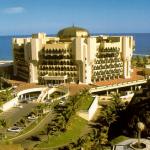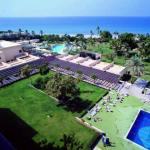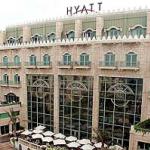Oman Traditions
 State religion is Islam. Unlike most countries in the Middle East, the Omanis are Muslims Ibadhi (Kharijite) persuasion. Given that a significant portion of the population are foreigners, the country has many adherents of other religions, with the freedom of religion is guaranteed by law.
State religion is Islam. Unlike most countries in the Middle East, the Omanis are Muslims Ibadhi (Kharijite) persuasion. Given that a significant portion of the population are foreigners, the country has many adherents of other religions, with the freedom of religion is guaranteed by law.Official holidays and weekends:
January 1 - New Year's.
November 18 - National Day.
November 19 - Birthday of Sultan Qaboos bin Said.
In accordance with the Muslim lunar calendar, at different times, are celebrated Eid al-Fitr (Ramadan), (Id al-Fitr, after three or four days after the end of Ramadan, 2 days), Eid al-Adha (Eid al-Chadha, Feast of the Sacrifice , 40 th day after Ramadan, 3 days), Laylat al-Isra 'Mi'raj or Wal-Miaradzh (Ascension Day of Prophet Mohammed), Milad an-Nabi or Maulid (birthday of Prophet Mohammed, June-July), the Muslim New Year ( 1-th of the month "Muharram"), the holy month of Ramadan (December-January), and others during Ramadan is changing schedule of institutions, places of entertainment, shops, restaurants, etc.
Festivals and Holidays:
Immediately after the Eid al-Fitr (usually in February) is conducted Muscat Festival, which, besides music and circus performances, conducted ethnographic holidays and festivities, as well as various fairs. National Day Festival - a formal event at which you can get mostly by special invitation. Autumn Festival Hariph in Salalah conducted from July to August. Tourist Festival Moultaka conducted during Eid al-Adha in cities across the country in turn.
At the end of the summer on the coast has "nayruz" changed in these parts in a true celebration of the Sea (tourist access is limited). In winter, on weekends in Batina held bullfights.
Conduct:
Much of the country subject to customs and traditional Islamic rules, so you should observe certain rules of conduct.
In banks, public telephones, post offices and other places there are separate windows for women. In the taxi women have a back seat, and in taxi - the front.
Do not withdraw military and police installations, airports, and the interior of mosques. In the household survey should also be very careful - you should not take pictures and even build the lens on men without their consent. Especially not encouraged to take photographs of women and clergy, sometimes actively prevent shooting even police.
The country has a sufficiently stringent environmental standards. On the coast of Ras Al-Hadd - Ras al-Dzhuneyz prohibited to collect shells and any other natural objects. Loud talking and taking pictures with flash is prohibited. Clothing should be dark. At the same time to attend these protected areas may not exceed 60 people. Also, without special permission are not allowed to visit the parks and reserves, to collect grass or take photographs (and indeed closer to the animals) during mating. Antelope Oryx specially protected by law.
The rise of coral and shells from the bottom, as well as trophies from shipwrecks are strictly prohibited. Any kind of fishing and spearfishing should be conducted in an organized manner and subject to licensing. Before going into the protected zone should always consult the Directorate of Nature Reserves in Muscat.
Oman - one of the safest countries in the world. The crime rate is extremely low. Even in the province and at night you can not fear any problems with the locals. To water the whole attitude here is very kind. In no case can swim in local waters in the open pour water on the ground (even for hygienic procedures) or to leave open the faucet. Tap water, basically, artesian or diluted, so it is safe for consumption, but due to complete lack of mineral salts in it is not recommended for drinking - better to use bottled water.
A separate problem is the "wadi" - usually dry bed of the streams and rivers. During the rainy season they quickly filled with water that is turbulent flow rushes down a drifting mass of soil and stones, and flooding are completely dry before areas. The country has even introduced a special parking sign "Beware of wadi!" (crossed by three horizontal wavy lines, vertical rectangle in the form of arrows).
The natural hazards include thermal (solar) stroke, high levels of solar radiation (use protective creams, sunglasses and clothing), a kind of local food and water. Dangerous wild animals virtually none. If immersion is to be feared of sharks, barracudas, stingrays, many coral fish, whose spines are poisonous enough, as well as sea urchins, whose long needle stuck in the human body. In the south, are quite strong currents and surf, which makes the immersion in an unknown place is dangerous undertaking.
In Oman, a sufficiently complicated system of notation streets and houses - most of them do not have names at all - only the number or name of the district. Some areas have a "local" names that are not listed in any references, but are actively used in everyday communication. Even more confusion caused abbreviations, which are usually pronounced fused and acquired the status of independent words (for example, the word "eychoup" denote the police, "emkyu - metropolitan area Madinat Sultan Qaboos, etc.).
Omanis are very sociable and can talk freely with a stranger, but the range of topics rather tightly constrained by certain rules - should not talk about his personal life (family - how much you like), about religion, local women, laws and customs. At the same time, the question to the woman about her husband or the number of children she is considered appropriate. Sultan enjoys unquestioned authority in the country, so any statements about him or his family may be perceived at least hostile.
Men at the meeting or the shake-hands, or dvoekratno denote kiss. With a woman to shake hands (and indeed touch) can be used only if such an initiative has shown herself or her husband, but it is not forbidden to greet a woman, even with the face covered, signaled the car horns and waved. Especial punctuality local residents did not differ.
Hospitality Omanis are widely known. The refusal of the invitation to visit can be regarded as a personal insult. Upon entering the house should always remove your shoes and follow the instructions of the owner. Omani meal passes without tables and chairs - the guests are placed on the floor, on special mats and cushions. Treats usually very light (tea, coffee, fruit, sweets, etc.), but quite abundant (a cup will be filled permanently), but not taken from him to refuse. Typically, to enable owners to understand that their hospitality received with due respect, but nothing is impossible to eat enough to shake his cup in his hands. Take food left hand is not accepted. Fig take a pinch, some pasty dishes (hoummus, mutabbel), you can take a piece of bread. Rounding out the meal is usually a toothpick (Hatab asnan ") or cumin seed (annut"), which are used to freshen the mouth.
Most hotels and restaurants are licensed to sell alcoholic beverages, to be employed on the spot, without the right to impose. Removal of alcohol on the street, drinking in public places, driving drunk and transportation of alcohol is punishable by law and punished harshly enough (up to imprisonment). Prices on alcohol are high. During Ramadan, alcohol is not sold. Evening on Wednesday and Thursday, many restaurants are overcrowded.
In some restaurants and cafes are no menus in the traditional sense of the word - dishes are ordered verbally or on the principle of "the same as for the fact table. However, the owners of such establishments are generally left to come to the aid of an alien if they see that he can not make an order.

